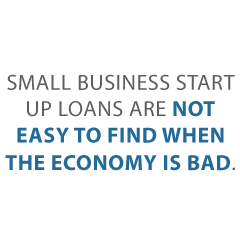There are many options for funding a startup. The most popular is small business start up loans. However, not everyone can just go to the bank and get a loan. Things like income and credit score get in the way. There are options if you find yourself in this situation.
Small Business Start Up Loans are Great, But Are There Other Options?
While business start up loans are the most popular option for funding a start up, sometimes you have to think outside of the box. Sometimes you have to stack different types of funding to get what you need. Here are some funding options, some loans and some not, that you should consider outside of traditional loans.
Credit Line Hybrid
What if there were an option that allowed you to have an even better interest rate than a secured loan, and yet get the money faster and easier than any type of traditional funding. Consider if you could get business funding without having to supply any bank statements or credit stubs? Just think, you could get funding in a few days rather than weeks without supplying any collateral or documents. That is exactly what the credit line hybrid lets you do.
It is revolving, unsecured financing. It allows you to fund your business without putting up collateral, and you only pay back what you use.
What are the Qualifications?
How hard is it to qualify? Not as hard as you may think. You do need good personal credit. That is, your personal credit score should be at least 700. In addition, you can’t have any liens, judgments, bankruptcies or late payments. Furthermore, in the past 6 months, you should have less than 5 credit inquiries.
Also, you should have less than a 45% balance on all business and personal credit cards. It’s also preferred that you have established business credit as well as personal credit.
If you do not meet all of the requirements, it’s okay. You can take on a credit partner that meets each of these requirements. Many business owners work with a friend or relative to fund their business. If a relative or a friend meets all of these requirements, they can pair with you to allow you to tap into their credit to access funding.
What are the Benefits of a Credit Line Hybrid?
This type of funding has many benefits. First, it is unsecured. That means you do not have to have any collateral. Next, you do not have to provide any bank statements or financials.
Not only that, you can get interest rates as low as 0% for the first few months, allowing you to put that savings back into your business.
The process is pretty fast, especially with a qualified expert to walk you through it. Another benefit is, with the approval for multiple credit cards, there is competition. This makes it easier, and even likely if you handle the credit responsibly, that you can get interest rates lowered and limits raised every few months.
SBA Options
Small business start up loans are a specialty of The Small Business Administration. These programs are designed for borrowers with lower credit scores than those required for traditional loans. The lowest credit score to qualify is 680.
Small Business Startup Loans: 7(a) Loans
This program offers federally funded term loans of up to $5 million. Funds can be used for expansion, purchasing equipment, and working capital in addition to startup. SBA partner lenders, usually banks, process these loans and disburse the funds.
There is also a down payment requirement of at least 10% for the purchase of a business, commercial real estate, or equipment. The minimum time in business is 2 years. For startups, business experience equivalent to two years will serve this purpose.
504 Loans
 These loans are also available up to $5 million. Funds can be used to buy machinery, facilities, or land. Typically, these loans are used for expansion. Like 7(a) loans, partner lenders process and disburse funds. These are especially great for real estate purchases.
These loans are also available up to $5 million. Funds can be used to buy machinery, facilities, or land. Typically, these loans are used for expansion. Like 7(a) loans, partner lenders process and disburse funds. These are especially great for real estate purchases.
Terms for 504 Loans range from 10 to 20 years, and funding can take from 30 to 90 days. The asset being financed is required for collateral. In addition, the down payment requirement of 10% remains, but can increase to 15% for a new business.
Again, you must be in business at least 2 years, or management has to have equivalent experience if the business is a startup.
Microloans
Microloans are available in amounts up to $50,000. They work for starting a business purchasing equipment, buying inventory, or for working capital. Community based non-profits administer microloan programs as intermediaries, with financing coming directly from the Small Business Administration.
The minimum credit score is 640, and the collateral and down payment requirements vary by lender.
Private Lender Options for Small Business Start Up Loans
If your personal credit score isn’t the best, consider looking at private lender options.
These are alternative lenders that have less strict eligibility requirements. They do have higher interest rates and less favorable terms than traditional loans however, so choose wisely.
BlueVine
BlueVine requires that you be in business for at least 6 months. If you have at least $120,000 in annual revenue, you may qualify for a loan from them. The minimum credit score for a line of credit from BlueVine is 600. Furthermore, if you want invoice factoring, you can get approval with a score as low as 530, 3 months in business, and $10,000 in monthly revenue.
Kiva
Kiva is different. How different? They are actually very different. For example, the interest rate is 0%. That means, even though you have to pay it back, a loan from them is free money. They don’t check your credit at all. However, you have to get at least 5 family members or friends to throw some money in to help fund your business. In addition, you have to pitch in a $25 loan to another business on the platform.
Accion
Accion may be a good fit for small business start up loans also. It’s a nonprofit that offers microloans. Installment loans are available to both startups and already existing businesses through Accion. The minimum credit score is 575. You don’t have to already be in business, but if you are not, you must have less than $500 in past due debt. In addition, your business needs to be home or incubator based.
Small Business Start Up Loans Are Just One Way to Fund a Startup
There are many ways to fund a startup. Small business start up loans are just one of them. The truth is, most businesses have to access more than one option to make things work. If you can start debt free with angel investors or crowdfunding, do that. If not, these other options are just what you need to get up and running.

